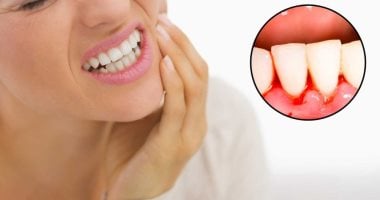اللثة ليست مجرد إطار لأسنانك، بل هي الأساس الذي يثبتها ويحميها من البكتيريا. عندما تكون سليمة، فإنها تعمل كدرع طبيعي يمنع الالتهابات ويحافظ على الابتسامة. أما إذا تضررت، فإن الطريق يصبح مفتوحًا لمشاكل تبدأ من نزيف بسيط وتنتهي بفقدان الأسنان.
اللثة الصحية عادةً وردية اللون أو بلون طبيعي متناسق مع بشرتك، مشدودة حول الأسنان دون أي فجوات، وملمسها متين مع نقاط صغيرة تشبه قشرة البرتقال. لا تشعر بألم عند لمسها، ولا يظهر منها أي انتفاخ غير طبيعي، هذا ما وضحه تقرير نشر فى موقع HEALTH .مؤكدا على أن اللثة الصحية ليست مجرد مظهر جمالي، بل أساس صحة الفم بأكمله. القليل من العناية اليومية يمكن أن يجنبك مشكلات معقدة وتكاليف علاجية كبيرة لاحقًا.
أية إشارات أو علامات مبكرة تظهر على اللثة يجب الانتباه لها وزيارة أقرب مختص، فعندما تضعف اللثة، تبدأ الأعراض بالظهور تدريجيًا: احمرار أو لون داكن، تورم، نزيف عند التفريش أو الأكل، وانكماش يكشف جذور الأسنان. في الحالات المتقدمة، تتكون فراغات بين الأسنان واللثة تمتلئ بالبكتيريا، وقد تلاحظ رائحة فم مزمنة.
الالتهابات مراحل، وليست متساوية. فهناك :
التهاب اللثة: المرحلة الأولى، ناتجة عن تراكم البلاك. غالبًا ما يكون بدون ألم واضح، لكن يمكن عكسه تمامًا إذا عالجته مبكرًا.
التهاب دواعم السن: المرحلة التالية، حيث تمتد العدوى إلى العظم الداعم. في هذه الحالة، قد تصبح الأسنان متخلخلة، وقد تفقد واحدة أو أكثر إذا لم يتم التدخل.
بعض الأعراض إذا ظهرت يجب الاستشارة الطبية وعدم التأجيل منها:
نزيف متكرر عند تنظيف الأسنان.
حساسية مفرطة للمشروبات الباردة أو الساخنة.
ألم أو صعوبة في المضغ.
تغير في ترتيب الأسنان أو تباعدها فجأة.
رائحة فم مستمرة لا تزول بالفرشاة أو غسول الفم.
لابد من تجنب بعض العادات التى تسبب التهابات اللثة المختلفة، منها :
إهمال تنظيف الأسنان مما يسمح للبلاك بالتصلب إلى جير يصعب إزالته.
التدخين بأنواعه، الذي يضعف مقاومة اللثة للالتهاب.
أنظمة غذائية فقيرة بالمعادن والفيتامينات الأساسية.
أمراض مزمنة مثل السكري التي تغذي البكتيريا الضارة.
تغييرات هرمونية تجعل اللثة أكثر حساسية، خاصة عند النساء.
أدوية تسبب جفاف الفم وتقلل إفراز اللعاب.
وإليك طرق الوقاية :
اغسل أسنانك مرتين يوميًا بفرشاة ناعمة ومعجون يحتوي فلورايد.
استخدم الخيط أو أجهزة تنظيف ما بين الأسنان لإزالة بقايا الطعام.
اشرب ماء بكثرة للمحافظة على ترطيب الفم.
زر طبيب الأسنان كل 6 أشهر للفحص والتنظيف.
تجنب التدخين والمشروبات السكرية قدر الإمكان.
احرص على تناول أطعمة غنية بالكالسيوم وفيتامين C.
إذا تم تشخيص المشكلة، قد يبدأ الطبيب بتنظيف احترافي شامل لإزالة البلاك والجير، وقد يستخدم تقنيات لتجريف الجذور إذا كانت العدوى متقدمة. في الحالات الشديدة، يمكن أن يتطلب الأمر جراحة لثوية لدعم الأسنان ومنع فقدانها.













Recommended for you
طالب الرفاعى يؤرخ لتراث الفن الكويتى فى "دوخى.. تقاسيم الصَبا"
مدينة المعارض تنجز نحو 80% من استعداداتها لانطلاق معرض دمشق الدولي
تقديم طلبات القبول الموحد الثلاثاء و640 طالبا سيتم قبولهم في الطب
البريد المصري: لدينا أكثر من 10 ملايين عميل في حساب التوفير.. ونوفر عوائد يومية وشهرية وسنوية
سمو الشيخ عيسى بن سلمان بن حمد آل خليفة يستقبل سفير الولايات المتحدة الأمريكية لدى مملكة البحرين
الجغبير: القطاع الصناعي يقود النمو الاقتصادي